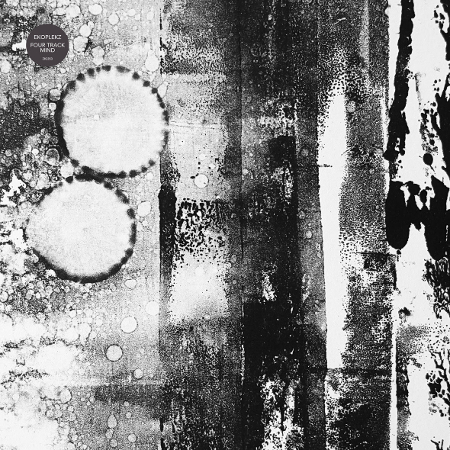 It’s been twelve years since the last, proper, Einstürzende Neubauten album, whatever that means. They’ve been detached from the music industry for a while now, pioneering some kind of multiple fan feedback mechanism, which I guess predated crowd-sourcing and kept them away from the supposed struggles associated with label imperatives and the pressure to relate (to the public, to their fans, to themselves).
It’s been twelve years since the last, proper, Einstürzende Neubauten album, whatever that means. They’ve been detached from the music industry for a while now, pioneering some kind of multiple fan feedback mechanism, which I guess predated crowd-sourcing and kept them away from the supposed struggles associated with label imperatives and the pressure to relate (to the public, to their fans, to themselves).
As ever, there’s a strange paradox at work. Neubauten’s music, even in it’s most tendrilled and collapsed, always seems extraordinarily composed, despite what you must assume is a necessarily chaotic studio practice. The fact that all these diverse sound elements – the springs, squeaks and metal clusters that accompany the more traditional instruments like shadow wasps – are not easily tuned or codified into notes has never been a problem for them. Those tumbling bolts always sounded like they ought to fall into the wheelbarrow like that, those scratches onto paper or ice or sand always gave the appearance of needing to sound like that that. Live, it always seemed like an element of chaos was let in to mess with the structures; but on record, one thing that characterises every album is how well produced it sounds. Even on Kollaps, there aren’t that many rough edges when you listen through the jackhammers and the Blixa Bargeld yelps.
(There’s not much screaming on this but, let’s all just agree on this one thing: Blixa is the best screamer of all time, isn’t he?)So, Neubauten spend a lot of time eliminating chance meetings (of dissection tables and shopping trolleys), right? Well… not exactly. A lot of this album, especially the texts, but also some of the field recordings and music, is a product of a randomised card game called Dave (after a car navigation voice). Dave is the sixth member of the band. I guess the I-Ching spanners are in all these works, but these random, John Cage-like, instructions never feel intrusive… for Neubauten it’s the manipulation and control of chance that is always key. That is the tension you can hear throughout this album (and throughout all their albums).
Another observation; none of their albums ever sound like anything but albums. They are albums qua albums. They don’t feel like collections of tracks. There’s a traditional album-focused integrity to Neubauten and a real care over quality control; they must have buckets of unreleased music, but only a few glimpses ever get seen (maybe their website is stuffed with this material, but I’ve ignored it). Alles In Allem is no different: the tracks are sequenced expertly and they all sound like they belong together. It seems almost like spoilers to try and recreate what these tracks sound like, but I’ll give a few clues.
This is characteristic of late-periuod Neubauten. Blixa as a European, sitting in the non-ruins of Berlin, giving out the odd scream which is quickly absorbed into the machine fabric of Neubauten as entity. Yes, you can’t imagine this band without Blixa, but you can imagine that he sometimes struggles to assert himself on it, because the band has different driving forces, has its own unique expectations and pulses.
“Am Landwehrkanal” has a little ewok-on-stormtrooper-helmet percussion line as it gently tells the story of the death of Rosa Luxemburg, her murder and how her body was thrown into the Landwehr Canal; whereas “Möbliertes Lied” goes back to the slowly unfolding rising springs and swells of the classic Neubauten ballads; there’s a sense of gentle sighing here, a nostalgia for chaos. The sleevenotes mention Blixa, in perplexed disbelief, complaining that “they won’t let you into the junkyards anymore – for safety and insurance reasons”. The old dangers are gone; long live the new (undamaged) flesh.“Zivilisatorisches Missgeschick” is all hums and air-raid sirens, and the seemingly implicit message to the fans: we are not gone… we are still not what you think… They collapse buildings, yes, but also categories. And, even in a language I don’t understand, you get a feel for Blixa’s understanding of the awkwardness of trying to absorb Neubauten into the music business; they’ve dipped in and out, but you never get the sense that they tried to make an album which fit — they didn’t make a Goo, for instance… or, if they did, they (thankfully) kept getting it wrong.
“Taschen” has beats that sounds like more amateur tapdancing. That George Orwell quote: “if you want a picture of the future, imagine a boot stamping on a human face… forever”. Blixa sings of dreams and waiting, or ravenous monstrosities and, well, you have to say this is well timed. Some string sounds remind me of the dancing in the film The Hairdresser’s Husband, a beautiful intrusion and a desperate longing.
Maybe I’m hearing things. Maybe that’s the point.
Later, some aggressive coastal sounds, uncalming, unheimlich; and then more speaking in tongues, or some rising Jhonn Balance-like Gregorian chanting or… At one point, Blixa picks up a guitar again and gives us a little echo of the past (you can imagine Nick Cave strutting around in front of him, just for a second) but this isn’t then, and now you could almost get a glimpse of a less obviously jazzy Spontaneous Music Ensemble (I’m thinking on “Grazer Damm”), though just as an impression rather than a soundalike.I’m not sure that’s true, but I’d be curious if you agreed. My Neubauten is unlikely to be the same as yours.
I could go on, but you’ll probably want to find out for yourself. I’ve said enough; it’s better to listen. If you want a quick line to ease your worries: nothing here sounds like anything other than Einstürzende Neubauten, nothing here will confound you too much, nothing will make you feel uneasy at the places they’ve found themselves. You’ll not be disappointed because you know them, as they know you.-Loki-



